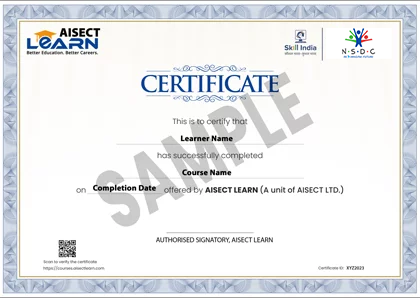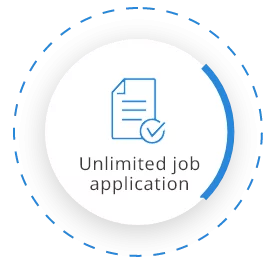Diploma in Artificial Intelligence & Machine Learning
Live
Fee: ₹60,000
 Dr. Priti Maheshwary | Professor Future Skills Academy
Dr. Priti Maheshwary | Professor Future Skills Academy
This course is designed for aspiring professionals looking for a career transition into the AI & ML space, who have basic programming skills, an interest in technology, and an analytical bent of mind. The learners will get acquainted with the fundamentals of Python, Machine Learning, Deep Learning, Natural Language Processing, Computer Vision, and Deployment of a cloud platform.
Objectives
This course is designed for aspiring professionals looking for a career transition into the AI & ML space, who have basic programming skills, an interest in technology, and an analytical bent of mind. The learners will get acquainted with the fundamentals of Python, Machine Learning, Deep Learning, Natural Language Processing, Computer Vision, and Deployment of a cloud platform.
How to discover patterns in the user data and then make predictions based on these intricate patterns for answering business questions and solving business problems.
How to make machines learn using different ML algorithms.
How to develop interaction between humans and computers using natural language.
How to enable computers and systems to derive meaningful information from digital images, videos, and other visual inputs.
How deploying an application through one or more hosting models—software as a service (SaaS), platform as a service (PaaS) and/or infrastructure as a service (IaaS) can be implemented.
What Will You Learn
With this course, you will learn: Python programming, Python libraries Numpy, Pandas, Matplotlib, Seaborn, Supervised Machine Learning, Unsupervised Machine Learning, Deep Learning, Natural Language Processing, Computer Vision, and Deployment on AWS cloud.
Skills you will gain
Want to know more about the course
Learn from the industry experts and stay ahead of the curve
Curriculum
-
Paper 1 - Introduction to Artificial Intelligence & Machine Learning
-
 Chapter 1 : Introduction to Artificial Intelligence
Chapter 1 : Introduction to Artificial Intelligence
-
 Chapter 2 : Introduction to machine Learning
Chapter 2 : Introduction to machine Learning
-
 Chapter 3 : Introduction to Deep Learning
Chapter 3 : Introduction to Deep Learning
-
 Chapter 4 : Real World Applications of AI/ML
Chapter 4 : Real World Applications of AI/ML
-
 Chapter 5 : Ethics in Machine Learning
Chapter 5 : Ethics in Machine Learning
-
 Chapter 5 : Ethics in Machine Learning
Chapter 5 : Ethics in Machine Learning
-
 Chapter 6 : Evaluation of Machine Learning codes
Chapter 6 : Evaluation of Machine Learning codes
-
-
Paper 2 - Mathematics and Statistics for AI/ML
-
 Chapter 1 : Python Statistics Libraries
Chapter 1 : Python Statistics Libraries
-
 Chapter 2 : Vectors
Chapter 2 : Vectors
-
 Chapter 3 : Matrix
Chapter 3 : Matrix
-
 Chapter 4 : Probability and Statistics
Chapter 4 : Probability and Statistics
-
 Chapter 5 : Descriptive Statistics
Chapter 5 : Descriptive Statistics
-
 Chapter 6 : Random Numbers
Chapter 6 : Random Numbers
-
-
Paper 3 - Python Programming & Data Manipulation and Visualization
-
 Chapter 1 : Introduction to Python
Chapter 1 : Introduction to Python
-
 Chapter 2 : Python Language Syntax & Data Types
Chapter 2 : Python Language Syntax & Data Types
-
 Chapter 3 : Conditions/Loops
Chapter 3 : Conditions/Loops
-
 Chapter 4 : Libraries in Python
Chapter 4 : Libraries in Python
-
 Chapter 5 : Numpy
Chapter 5 : Numpy
-
 Chapter 6 : Panda
Chapter 6 : Panda
-
 Chapter 7 : Data Story Telling
Chapter 7 : Data Story Telling
-
 Chapter 8 : Data Acquisition
Chapter 8 : Data Acquisition
-
 Chapter 9 : Data Cleaning and Preprocessing
Chapter 9 : Data Cleaning and Preprocessing
-
 Chapter 10 : Data Manipulation Using Excel
Chapter 10 : Data Manipulation Using Excel
-
 Chapter 11 : Data Manipulation using MySQL
Chapter 11 : Data Manipulation using MySQL
-
 Chapter 12 : Advance Queries
Chapter 12 : Advance Queries
-
 Chapter 13 : Data Visualization Using Python
Chapter 13 : Data Visualization Using Python
-
 Chapter 14 : Data Visualization Using PowerBI
Chapter 14 : Data Visualization Using PowerBI
-
-
Module 4 - Supervised & Unsupervised learning
-
 Chapter 1 : Introduction to Supervised Learning
Chapter 1 : Introduction to Supervised Learning
-
 Chapter 2 : Linear Regression
Chapter 2 : Linear Regression
-
 Chapter 3 : Multiple Linear Regression
Chapter 3 : Multiple Linear Regression
-
 Chapter 4 : Logistic Regression
Chapter 4 : Logistic Regression
-
 Chapter 5 : SVM
Chapter 5 : SVM
-
 Chapter 6 : KNN
Chapter 6 : KNN
-
 Chapter 7 : Random Forest Algorithm
Chapter 7 : Random Forest Algorithm
-
 Chapter 8 : Naïve Bayes
Chapter 8 : Naïve Bayes
-
 Chapter 9 : Types of Learning
Chapter 9 : Types of Learning
-
 Chapter 10 : Clustering in Machine Learning
Chapter 10 : Clustering in Machine Learning
-
 Chapter 11 : K means Clustering
Chapter 11 : K means Clustering
-
 Chapter 12 : Elbow Method for optimal value of k in Kmeans
Chapter 12 : Elbow Method for optimal value of k in Kmeans
-
 Chapter 13 : Mean-shift Clustering
Chapter 13 : Mean-shift Clustering
-
 Chapter 14 : Fuzzy Clustering
Chapter 14 : Fuzzy Clustering
-
-
Module 5 - Reinforcement Learning and Story Telling
-
 Chapter 1 : Introduction Reinforcement Learning
Chapter 1 : Introduction Reinforcement Learning
-
 Chapter 2 : Q-Learning Algorithms
Chapter 2 : Q-Learning Algorithms
-
 Chapter 3 : Introduction to Thompson Sampling
Chapter 3 : Introduction to Thompson Sampling
-
 Chapter 4 : Genetic Algorithm for Reinforcement Learning
Chapter 4 : Genetic Algorithm for Reinforcement Learning
-
 Chapter 5 : SARSA Reinforcement
Chapter 5 : SARSA Reinforcement
-
 Chapter 6 : Q-Learning in Python Example
Chapter 6 : Q-Learning in Python Example
-
 Chapter 7 : Story Telling
Chapter 7 : Story Telling
-
-
Module 6 - Tensor Flow Pytouch
-
 Chapter 1 : Tensor Flow Basic
Chapter 1 : Tensor Flow Basic
-
 Chapter 2 : Tensor Flow Perceptron
Chapter 2 : Tensor Flow Perceptron
-
 Chapter 3 : CNN in TensorFlow
Chapter 3 : CNN in TensorFlow
-
 Chapter 4 : RNN in TensorFlow
Chapter 4 : RNN in TensorFlow
-
 Chapter 5 : Introduction to Keras
Chapter 5 : Introduction to Keras
-
 Chapter 6 : Distributed Computing TensorFlow
Chapter 6 : Distributed Computing TensorFlow
-
 Chapter 7 : Multi Layer Perceptron Learning
Chapter 7 : Multi Layer Perceptron Learning
-
 Chapter 8 : Image Recognition using TensorFlow
Chapter 8 : Image Recognition using TensorFlow
-
 Chapter 9 :The Role of Cloud Computing in Artificial Intelligence
Chapter 9 :The Role of Cloud Computing in Artificial Intelligence
-
 Chapter 10 : Cloud deployment ,its types and popular service providers
Chapter 10 : Cloud deployment ,its types and popular service providers
-
 Chapter 11 : Building the model using Jupiter notebook
Chapter 11 : Building the model using Jupiter notebook
-
 Chapter 12 : Export the model using Pickle
Chapter 12 : Export the model using Pickle
-
 Chapter 13 : Build a Flask website to serve the model
Chapter 13 : Build a Flask website to serve the model
-
 Chapter 14 : Steps in Deploying model to aws
Chapter 14 : Steps in Deploying model to aws
-
 Chapter 15 : Introduction to GIT and GITHUB ,installation and creating repository
Chapter 15 : Introduction to GIT and GITHUB ,installation and creating repository
-
-
Module 7 - Natural Language Processing
-
 Chapter 1 : Introduction to Natural Language Processing
Chapter 1 : Introduction to Natural Language Processing
-
 Chapter 2 : Steps to Train Dataset for NLP
Chapter 2 : Steps to Train Dataset for NLP
-
 Chapter 3 : Text Preprocessing in Python
Chapter 3 : Text Preprocessing in Python
-
 Chapter 4 : Removing stop words with NLTK in Python
Chapter 4 : Removing stop words with NLTK in Python
-
 Chapter 5 : Tokenize text using NLTK in Python
Chapter 5 : Tokenize text using NLTK in Python
-
 Chapter 6 : Restaurant Reviews Project
Chapter 6 : Restaurant Reviews Project
-
-
Module 8 - Artificial Neural network
-
 Chapter 1 : Introduction to Artificial Neural Networks
Chapter 1 : Introduction to Artificial Neural Networks
-
 Chapter 2 : Structure of Neural Network
Chapter 2 : Structure of Neural Network
-
 Chapter 3 : Characteristics of ANN
Chapter 3 : Characteristics of ANN
-
 Chapter 4 : Types Neural Network
Chapter 4 : Types Neural Network
-
 Chapter 5 : Implementing ANN Training process in Python
Chapter 5 : Implementing ANN Training process in Python
-
-
Module 9 - Computer Vision
-
 Chapter 1 : Introduction to Computer Vision?
Chapter 1 : Introduction to Computer Vision?
-
 Chapter 2 : Computer vision and Image processing
Chapter 2 : Computer vision and Image processing
-
 Chapter 3 : Installing useful packages
Chapter 3 : Installing useful packages
-
 Chapter 4 : Introduction to OpenCV
Chapter 4 : Introduction to OpenCV
-
 Chapter 5 : Reading , Writing and displaying an image
Chapter 5 : Reading , Writing and displaying an image
-
 Chapter 6 : Color Space Conversion
Chapter 6 : Color Space Conversion
-
 Chapter 7 : Edge Detection
Chapter 7 : Edge Detection
-
 Chapter 8 : Face Detection
Chapter 8 : Face Detection
-
 Chapter 9 : Eye detection
Chapter 9 : Eye detection
-
Instructor

Dr. Priti Maheshwary
Professor at Future Skills AcademyPresently working in Future Skill Academy. Involved in Computer Science and Engineering for over 20 years in higher education and training. Her career has included various software development projects, teaching, research and administrative roles. She enjoys teaching and looking into how to improve student learning experience. Published around 50 research papers in refereed journals and conferences, 7 book chapters, 6 Patents. 8 PhD thesis completed under her guidance in the field of Internet of Things, Smart Cities, Ubiquitous Computing, Wireless Sensor Network, VANET, Image Processing specialized in Satellite Images, AI/ML & Deep Learning, and Cyber Security. Also done more than 10 projects in the field of Research and Consultancy.

Dr. Pooja Bijlani
Trainer (Subject Expert) Future Skill AcademyPresently she is working as a IT Trainer (Subject Expert) at Future Skill Academy, AISECT, Bhopal. She has over 15 years of academic and research experience. Expert in Programming Languages C,C++,Python , Java ,React Spring Boot, Artificial Intelligence , Machine Learning and Data Science. Students accolades her programming language teaching skills . Having experience in number of End to End projects in Natural language Processing , Computer Vision and Python Desktop Application GUI. Web Designing.
Still have queries? Talk to our counselors who are available to guide you.
Shareable Certificate

Other Details
Diploma in Artificial Intelligence & Machine Learning
 Start Date
Start Date  Credentials
Credentials Get Job Assistance and Jumpstart Your Career in Artificial Intelligence & Machine Learning





Associated Courses
 Instructor:
Instructor:
 Duration:
Duration:
 Lectures:
Lectures:
 Course Credit:
Course Credit:
 Certification Body:
Certification Body:
 Language:
Language:
 Access:
Access:
 Downloadable Resources:
Downloadable Resources:
 Shareable Certificate:
Shareable Certificate:
